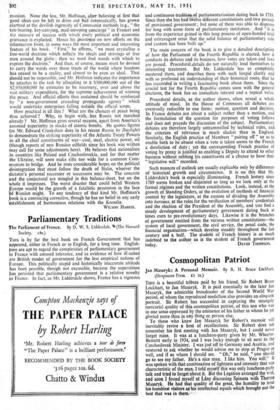Parliamentary Traditions
THIS is by far the best book on French Government that has appeared, either in French or in English, for a long time. English- Men are apt to regard the complexities of parliamentary government in France with amused tolerance, and as evidence of how ill-suited are British modes of government for the less empirical nations of Europe. This politically stupid and historically inaccurate attitude has been possible, though not excusable, because the superstition has persisted that parliamentary government is a relative novelty in France. In fact, as Mr. Lidderdale shows, France has a vigorous
and continuous traditioss of parliamentarianism dating back to 1789. Since then she has had twelve different constitutions and two periods of provisional government ; but none of them was able to dispense for long with some form of parliamentary institution. And " it is from the experience gained in this long process of open-handed trial and extravagant error that the solid balance of parliamentary rule and custom has been built up."
The main concern of the book is to give a detailed description of how the Parliament of the Fourth Republic is elected, how it conducts its debates and its business, how votes are taken and laws are passed. Procedurahdetails do not naturally lend themselves to interesting treatment. But Mr. Lidderdale has so completely mastered them, and describes them with such limpid clarity and with so profound an understanding of their historical roots, that he has succeeded in writing a fascinating book about them. Since the crucial test for the Fourth Republic comes soon with the general elections, the book has an immediate interest and a topical value.
Procedural details, as the author shows, often reveal a whole attitude of mind. In the House of Commons all debates are eventually reducible to one form: motion, question and decision. In France debates are about a subject rather than a motion, and the formulation of the question for purposes of voting follows and does not precede the discussion of the subject. Parliamentary debates are therefore largely untrammelled by technical rules, and- the criterion of relevance is much slacker than in England. Similarly, the English practice of Members "pairing off" so as to enable both to be absent when a vote is taken seems to the French a dereliction of duty ; yet the corresponding French practice of voting by proxy is justified as enabling a Deputy to attend to other business without robbing his constituents of a chance to have their "legislative will" recorded.
Such nuances of outlook are usually explicable only by differences of historical growth and circumstance. It is on this that Mr. Lidderdale's book is especially illuminating. French history since 1789 seems broken and disjointed so long as we look only at the formal regimes and the written constitutions. Look, instead, at the growth of Standing Orders, at the evolution of methods of financial control by the legislature, at the custom of dividing the Assembly into bureaux, at the rules for the verification of members' credentials and the election of the President of the Assembly, and you find a steady development of parliamentary government dating back at times even to pre-revolutionary days. Likewise it is the branches of government omitted from the various written constitutions—the system of local government, the civil service, the penal code, the financial organisation—which develop steadily throughout the last century and a half. The student of French history is as much indebted to the author as is the student of French government


































 Previous page
Previous page